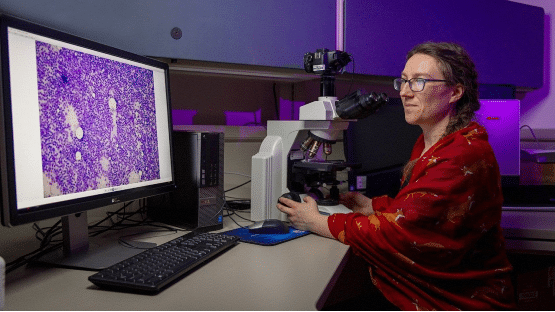
A pioneering research project led by Ph.D. student Christina Pacholec at the Virginia-Maryland College of Veterinary Medicine aims to make significant strides toward revolutionizing lymphoma diagnosis in dogs.
Lymphoma, one of the most common cancers affecting dogs, typically needs multiple vet visits and tests for a correct diagnosis. Traditional methods, such as biopsies, are not only invasive but also costly and time-consuming. The project’s goal is to harness the power of artificial intelligence (AI) to make cancer diagnostics more accessible and affordable for pet owners.
Leveraging AI to analyze cytological images, which means examining cell samples under a microscope, could enable early detection of lymphoma through less invasive, quicker and more cost-effective methods.
The project’s initial phase is training an AI tool to distinguish between lymphoma-affected and healthy dogs by analyzing cytology images. The team will use more than 10,000 lymph node aspirate images already on file at the Veterinary Teaching Hospital for AI training.
For the second phase, the research will focus on the pre-emptive identification of lymphoma, which involves modifying the original AI model using a technique known as transference, enabling AI to detect much earlier emerging disease patterns. The adaptation could lead to more timely, earlier interventions and an enhanced approach to managing lymphoma.
Early detection of lymphoma can significantly influence treatment strategies and lead to improved outcomes for affected pets. The testing method, based on cytology, is minimally invasive and could be a low-cost alternative for pet owners. The research aligns with the Spectrum of Care Initiative, to increase the range of affordable diagnostic and treatment options available. The research not only has the potential to transform veterinary medicine but could also offer insights that could benefit human cancer diagnostics.
Pacholec’s path to her Ph.D. and specialization in veterinary pathology was fueled by her desire to contribute meaningfully to veterinary medicine. Her clinical work has provided her with perspective on patient care and diagnostics, and enriched her research endeavors.
“The clinical work only helped because I have seen the differentials, I know the patients. …So I would say daily I pull from that knowledge,” she said.
Pacholec has undertaken multiple machine learning and image analysis courses to equip herself for the research, as well as participated in AI workshops and meetings.
“Christina’s commitment to enhancing her skills in bioinformatics and computational pathology is crucial. Her proactive approach in attending these courses and workshops will undoubtedly contribute to her success in this research field,” said Kurt Zimmerman, Pacholec’s mentor for her Morris Animal Foundation Training Fellowship, professor of pathology and associate department head of Biomedical Sciences and Pathobiology.
“Christina’s diagnostic insight and understanding of disease pathogenesis are exceptionally well-developed. She is an incredible clinical pathologist,” Zimmerman said. “I am fortunate to have the opportunity to work with a graduate student of Dr. Pacholec’s caliber.”
The research is supported by a series of grants, including start-up internal funding from the college, contributions from the American Kennel Club, and a significant grant from the Morris Animal Foundation. This financial backing has been crucial in advancing the project, enabling the team to undertake both the retrospective analysis and the prospective study. The commitment of these organizations to Pacholec’s research underscores their support for upcoming researchers and the potential impact of her work on veterinary medicine.
The hope is to build on the research to advance veterinary diagnostics through AI, with aspirations to enhance early detection and treatment of lymphoma in dogs. The project aims to explore the AI model’s capability for broader diagnostic applications, particularly in identifying minimal residual disease.
The project is dedicated to sharing its findings openly and working with computer science and engineering experts. “Collaborating would be a goal down the road,” said Pacholec.
“Why this research is important,” said Pacholec, “is because at the heart of veterinary medicine is the desire to improve the lives of our patients. By developing affordable, accurate and minimally invasive diagnostics, we can hopefully significantly impact pet cancer treatment, ensuring a better quality of life.”










